
Master of Science in Applied Mathematics
Preparation
A student with inadequate undergraduate preparation may be accepted conditionally but will be required to complete courses for the removal of the deficiency in the first year of study; among these courses, at most one of MATH 531 and MATH 537 can count towards the degree course requirements.
| All of the following |
|
| One of the following |
|
| One of the following |
|

Required Courses (31 units)
The 31 units may include at most 12 units of approved 500-level mathematics courses and at most six units of independent research (Mathematics 797, 798, 799A, 799B). Math 798 may not be counted toward the degree program without permission of the graduate adviser.
| All of the following |
|
| One of the following |
|
| One of the following |
|
Other requirements
Program of study.
The program of study,to include a plan for removal of any conditions on admission,
must be approved by the graduate adviser and will include at least 22 units in mathematics
or statistics.
Thesis.
Students must select Plan A and complete Math 799A (Thesis) and give a public oral
defense of the thesis. The thesis normally takes one year to complete and is done
under the direction of a thesis adviser.
Degree Learning Outcomes
Listed below are the applicable Degree Learning Outcomes (DLOs) for this degree.
-
Comprehensive learning.
Students will gain fundamental learning and understanding of concepts and methods
of applied mathematics, including analysis and computational methods, in four core
areas: advanced calculus; elementary differential equations; mathematical programming;
and linear algebra.
Courses: Math 330, Math 337, Math 340, Math 524, and either Math 531 or Math 537. -
Original research work.
Students will gain experience in conducting original research in applied mathematics,
including solving innovative problems that involve analysis and/or computational methods.
It is expected for students to develop in-depth understanding of applied mathematical
models and numerical methods to solve them.
Courses: Math 636, Math 630 or Math 638, Math 693A or Math 693B, Math 780, Math 797, and Math 799A.
Electives: Stat 551A, and other course approved by the Graduate Advisor. -
Develop scholarly written communication skills.
Students will write well-organized technical reports in support of the original
research work conducted under the guidance of a thesis advisor. If possible, students
will translate those reports and thesis work into a formal manuscript for submission
to a peer-reviewed journal.
Courses: Math 780, Math 797. -
Formal presentations.
Students will report findings of the original research work through oral presentations
in seminars and through their formal thesis defense.
Courses: Math 780, Math 797, and Math 799A.